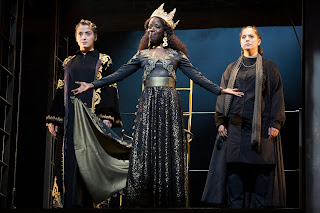The RSC's "T" season opens with the return of former Artistic Director Michael Boyd, and his edit of Christopher Marlowe's two Tamburlaine the Great plays into a single bloodthirsty epic. Mycetes, King of Persia, is played by Mark Hadfield in the performance that Mark Hadfield gives, meaning his brother Cosroe (David Sturzaker) sees him as a joke who should be replaced - by him. Cosroe joins forces with Tamburlaine (Jude Owusu,) a Scythian shepherd's son and bandit with a growing reputation as a soldier, to overthrow his brother. This they do easily, but Cosroe has underestimated his new ally, who promptly betrays him, kills him and takes the throne for himself. But all this gives him is a taste of the kind of power he wants - kings seem to be ten-a-penny and Tamburlaine wants to be above them all, Emperor of as much of Asia Minor, Africa and Eastern Europe as he can manage in his lifetime.
His plan is pretty simple - kill anybody who even remotely stands in his way. Tamburlaine makes Titus Andronicus seem subtle and restrained: At least in Shakespeare's play the crazy violence is instigated by two people, here it's just one increasingly unhinged ruler.
Marlowe's play is credited with influencing English tragedies for decades to come in its use of language and structure. In terms of the language this comes across well here, the verse sophisticated but clear. In structure it feels much more of a blunt instrument, a relentless bloodbath as endless alliances of kings try to take Tamburlaine down, only to be annihilated. And the title character is hardly a nuanced antihero, he's a sadist who subjects his defeated foes to torture and humiliation. So it's to the credit of both Boyd's production and Owusu's performance that the lengthy show remains watchable.
Knowing that this was one of the first smash hits of Jacobethan theatre meant I couldn't help looking out for ways its influence might have been felt in later plays. The King of Natolia (Ralph Davis) having his tongue cut out has an obvious through-line with Titus, as does Tamburlaine murdering one of his own sons (Raj Bajaj) for not being bloodthirsty enough. But the way the defeated Empress of Turkey (Debbie Korley) is allowed to stay on as a slave and wanders around Tamburlaine's court pronouncing curses also gave me echoes of Shakespeare's Queen Margaret, and the elaborate way Olympia (Zainab Hasan) tricks Theridamas (Edmund Wiseman) into killing her feels like a precursor to some of John Webster's elaborate deaths.
Despite a large cast, the rate at which Tamburlaine gets through enemies means there's a lot of role doubling, something which Boyd overtly acknowledges in ways that have varied results: When his beloved wife, and the only thing keeping Tamburlaine even remotely sane, dies, Rosy McEwen explicitly steps out of that role and into that of Callapine, son of two of his earlier victims and last seen as a child. I found more confusing the decision to have actors keep the death scars of their former characters - most notably Davis, whose first character slits his own throat and who then spends the rest of the show with a gash around his neck. I guess this is Tamburlaine being haunted by the metaphorical ghosts of his victims, but I was initially confused and thought they were literal ones. Besides, Tamburlaine isn't Macbeth, he doesn't have even a shred of regret over anyone he's murdered.
Tom Piper's designs become more contemporary as the play goes on - a nod to the fact that the region remains violent today, but to be honest it's a conceit that's starting to feel hackneyed. More successful is the use of crowns: Tamburlaine collects them and almost everyone seems to wear one at some point or other, the ultimate sign of power reduced to a commonplace under Tamburlaine's rule. Literally under it in the most deranged scene as he rides on a cage filled with crowns like a makeshift Iron Throne, drawn by defeated kings wearing bits like horses, with his dead wife's mummified corpse taken along for the ride in a wheelchair behind him.
This was my first Tamburlaine so I can't compare it to how it plays out compared to the original, two-play version. Certainly the first part is a pretty relentless stream of conquest while the second starts to take a different turn, becoming more about power turning into insanity. It's interesting that the final act of hubris that brings the protagonist down is burning the Qu'ran - I wouldn't have expected even that level of respect for Islam from Marlowe given his usual cheerful bigotry against.. you know, basically everyone (in fact the play comes across comparatively respectful to Islam in general, but I don't know how much of that to attribute to Boyd's edit*.) What we do get in this production at times borders on exhausting in its endless violence, but there's enough variety in the second part to turn it into a bizarre but watchable nightmare.
Tamburlaine by Christopher Marlowe is booking in repertory until the 1st of December at the Swan Theatre, Stratford-upon-Avon.
Running time: 3 hours 25 minutes including interval.
Photo credit: Ellie Kurttz.
*if the original is reasonably polite to Muslims I can only assume that means Marlowe didn't know enough about them to really go for it because, like I say, there's the evidence of everything else he ever wrote .






No comments:
Post a Comment